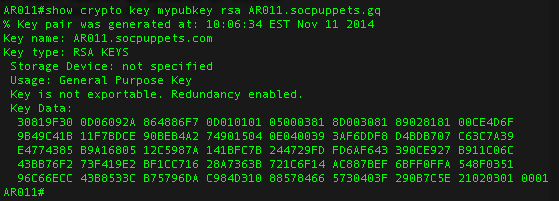Rsa Key Pair Generation Java
- Rsa Key Pair Generation Java Software
- Rsa Key Pair Generation Java Download
- Create Rsa Key Pair
- Rsa Key Pair Generation Java 1
- Java Rsa Key Generation
RSA example with random key generation. RSA example with PKCS #1 Padding. RSA example with OAEP Padding and random key generation. An example of using RSA to encrypt a single asymmetric key. Simple Digital Signature Example: 36.38.7. Creates a 1024 bit RSA key pair and stores it to the filesystem as two files. Feb 02, 2013 Java Code for RSA Key Generation.
getInstanceRsa Key Pair Generation Java Software
Generating a new SSH key. Open Terminal Terminal Git Bash. Paste the text below, substituting in your GitHub email address. $ ssh-keygen -t rsa -b 4096 -C 'youremail@example.com' This creates a new ssh key, using the provided email as a label. Generating public/private rsa key pair. The next step is to initialize the key pair generator. All key pair generators share the concepts of a keysize and a source of randomness. The KeyPairGenerator class has an initialize method that takes these two types of arguments. The keysize for a DSA key generator is the key length (in bits), which you will set to 1024. The Java KeyPairGenerator class (java.security.KeyPairGenerator) is used to generate asymmetric encryption / decryption key pairs. An asymmetric key pair consists of two keys. The first key is typically used to encrypt data. The second key which is used to decrypt data encrypted with the first key. Public Key, Private Key Type Key Pairs. The most commonly known type of asymmetric key pair is the public key.
Rsa Key Pair Generation Java Download
factory methods (static methods that return instances of a given class).powerpoint program for mac free A Key pair generator for a particular algorithm creates a public/private key pair that can be used with this algorithm. It also associates algorithm-specific parameters with each of the generated keys.
Create Rsa Key Pair

There are two ways to generate a key pair: in an algorithm-independent manner, and in an algorithm-specific manner. The only difference between the two is the initialization of the object:
- Algorithm-Independent Initialization
All key pair generators share the concepts of a keysize and a source of randomness. The keysize is interpreted differently for different algorithms (e.g., in the case of the DSA algorithm, the keysize corresponds to the length of the modulus). There is an
initializemethod in this KeyPairGenerator class that takes these two universally shared types of arguments. There is also one that takes just akeysizeargument, and uses theSecureRandomimplementation of the highest-priority installed provider as the source of randomness. (If none of the installed providers supply an implementation ofSecureRandom, a system-provided source of randomness is used.)Since no other parameters are specified when you call the above algorithm-independent
initializemethods, it is up to the provider what to do about the algorithm-specific parameters (if any) to be associated with each of the keys.If the algorithm is the DSA algorithm, and the keysize (modulus size) is 512, 768, or 1024, then the Sun provider uses a set of precomputed values for the
p,q, andgparameters. If the modulus size is not one of the above values, the Sun provider creates a new set of parameters. Other providers might have precomputed parameter sets for more than just the three modulus sizes mentioned above. Still others might not have a list of precomputed parameters at all and instead always create new parameter sets. - Algorithm-Specific Initialization
For situations where a set of algorithm-specific parameters already exists (e.g., so-called community parameters in DSA), there are two
initializemethods that have anAlgorithmParameterSpecargument. One also has aSecureRandomargument, while the the other uses theSecureRandomimplementation of the highest-priority installed provider as the source of randomness. (If none of the installed providers supply an implementation ofSecureRandom, a system-provided source of randomness is used.)
In case the client does not explicitly initialize the KeyPairGenerator (via a call to an initialize Football manager activation key generator free download. method), each provider must supply (and document) a default initialization. For example, the Sun provider uses a default modulus size (keysize) of 1024 bits.
Note that this class is abstract and extends from KeyPairGeneratorSpi for historical reasons. Application developers should only take notice of the methods defined in this KeyPairGenerator class; all the methods in the superclass are intended for cryptographic service providers who wish to supply their own implementations of key pair generators.
Every implementation of the Java platform is required to support the following standard KeyPairGenerator algorithms and keysizes in parentheses:
Rsa Key Pair Generation Java 1
- DiffieHellman (1024)
- DSA (1024)
- RSA (1024, 2048)